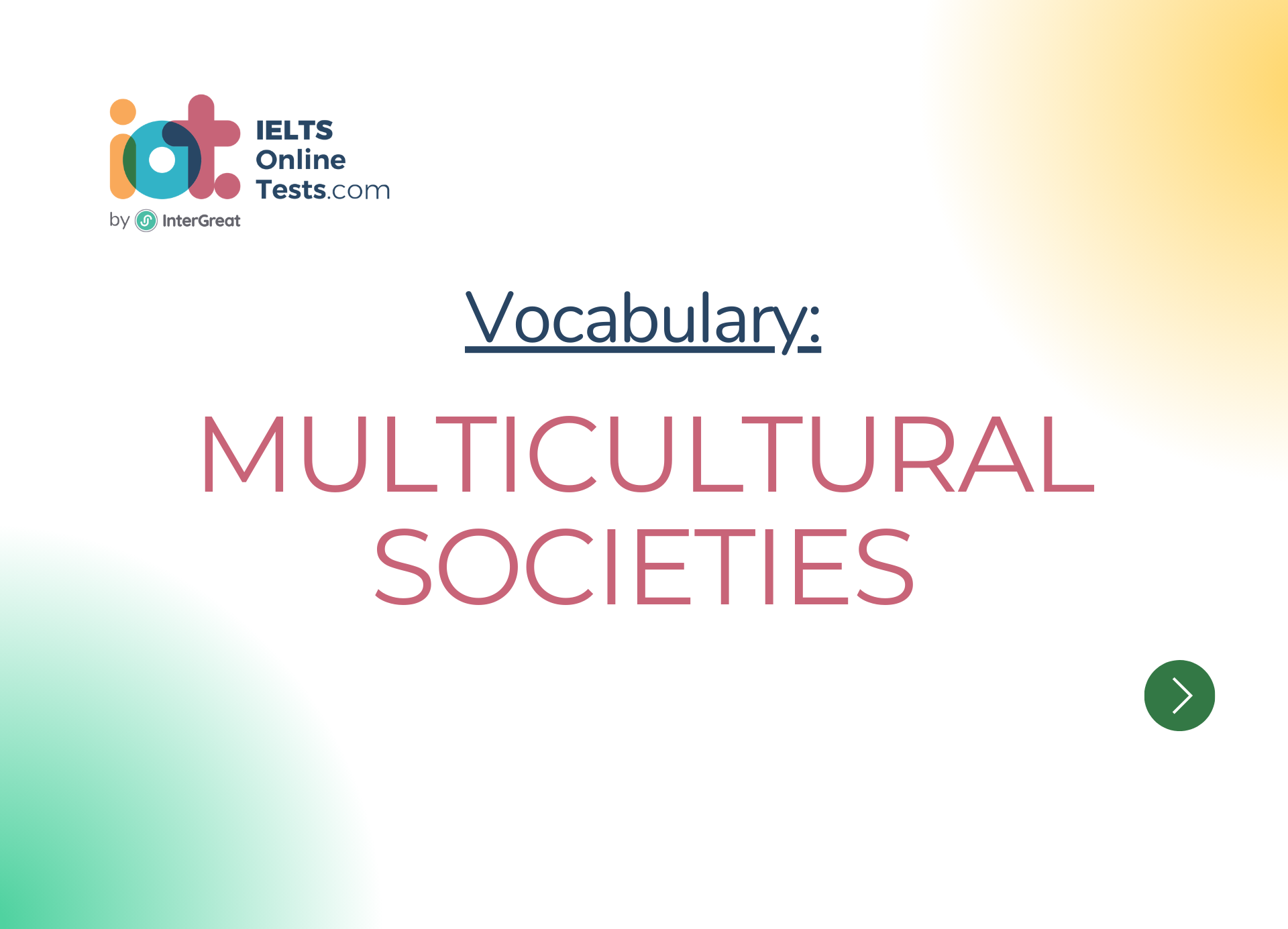
Multicultural societies
Below is a detailed list of vocabulary related to multicultural societies, along with their definitions. These words and phrases will help you discuss various aspects of multiculturalism and diverse societies, showcasing a strong grasp of the topic during the IELTS exam or any discussions about multicultural communities.
Multicultural Society:
- Definition: A society that comprises diverse cultural, ethnic, religious, and linguistic groups, coexisting and interacting with one another.
Integration:
- Definition: The process of incorporating individuals from different cultural backgrounds into the broader society, fostering unity and understanding.
Cultural Exchange:
- Definition: The sharing and interchange of cultural practices, traditions, and customs between various cultural groups.
Cultural Diversity:
- Definition: The existence of multiple cultures and cultural identities within a society, promoting inclusivity and tolerance.
Tolerance:
- Definition: Acceptance and respect for the differences in beliefs, customs, and practices of others.
Inclusivity:
- Definition: The principle of involving and valuing individuals from all cultural backgrounds, ensuring their active participation and representation.
Cultural Pluralism:
- Definition: A model that encourages the coexistence and mutual respect of different cultural groups while maintaining their distinct identities.
Ethnicity:
- Definition: The classification of individuals based on shared cultural traits, such as language, ancestry, and traditions.
Cultural Integration:
- Definition: The blending and harmonization of cultural practices and traditions between different cultural groups.
Diversity Training:
- Definition: Programs or workshops designed to educate individuals about cultural diversity and promote inclusivity.
Cultural Awareness:
- Definition: Consciousness and knowledge of one's own cultural background and an appreciation for the diversity of others.
Ethnocentrism:
- Definition: The belief that one's own cultural or ethnic group is superior to others, leading to prejudice or bias.
Cultural Sensitivity:
- Definition: The awareness and understanding of cultural differences to avoid offending or misinterpreting others.
Cultural Exchange Programs:
- Definition: Initiatives that facilitate the exchange of individuals between different countries or cultures for educational or cultural purposes.
Cultural Celebrations:
- Definition: Festivities or events that honor and showcase the traditions and customs of a particular cultural group.
Cultural Assimilation:
- Definition: The process by which individuals adopt the dominant culture of a society and may lose some aspects of their original cultural identity.
Cultural Revitalization:
- Definition: Efforts to preserve, promote, and revive cultural practices, languages, and traditions that may be at risk of being lost.
Cultural Norms:
- Definition: Accepted patterns of behavior, values, and beliefs within a specific cultural group.
Ethnic Minority:
- Definition: A group of people who share a particular cultural, racial, or ethnic background and form a smaller portion of the population.
Cultural Preservation:
- Definition: Actions taken to protect and safeguard cultural heritage and traditions from disappearing over time.
Cultural Heritage:
- Definition: The traditions, customs, beliefs, and artifacts that are passed down through generations within a cultural group.
Intercultural Communication:
- Definition: The process of exchanging information and ideas between people from different cultural backgrounds.
Cultural Identity:
- Definition: The sense of belonging and connection that individuals or groups feel towards their cultural heritage and traditions.
Cultural Conflict:
- Definition: Tensions or disagreements arising from differences in cultural practices or values.
Cultural Exchange Events:
- Definition: Gatherings or occasions specifically organized to promote cultural exchange and understanding between diverse communities.
Cultural Competence:
- Definition: The ability to interact effectively and respectfully with individuals from different cultural backgrounds.
Cross-Cultural Understanding:
- Definition: The ability to comprehend and appreciate the values, beliefs, and behaviors of other cultures.
Cultural Bridge:
- Definition: An entity, program, or initiative that fosters connections and communication between people from diverse cultural backgrounds.
Cultural Fusion:
- Definition: The blending of cultural elements and influences, resulting in the emergence of new cultural expressions.
Cultural Interaction:
- Definition: The process of individuals or groups from different cultures coming into contact and engaging with one another.
Cultural Awareness Campaigns:
- Definition: Efforts to raise awareness about cultural diversity and promote understanding among the general public.
Interethnic:
- Definition: Relating to or involving interactions between different ethnic groups.
Cross-Cultural Collaboration:
- Definition: Cooperative efforts between individuals or organizations from diverse cultural backgrounds.
Cultural Coexistence:
- Definition: The peaceful and harmonious existence of diverse cultural groups within a society.
Intercultural Competence:
- Definition: The ability to communicate effectively and navigate cultural differences in a multicultural environment.
As you study and use these vocabulary words, practice incorporating them into your speaking and writing to demonstrate a strong understanding of multicultural societies during the IELTS exam.




